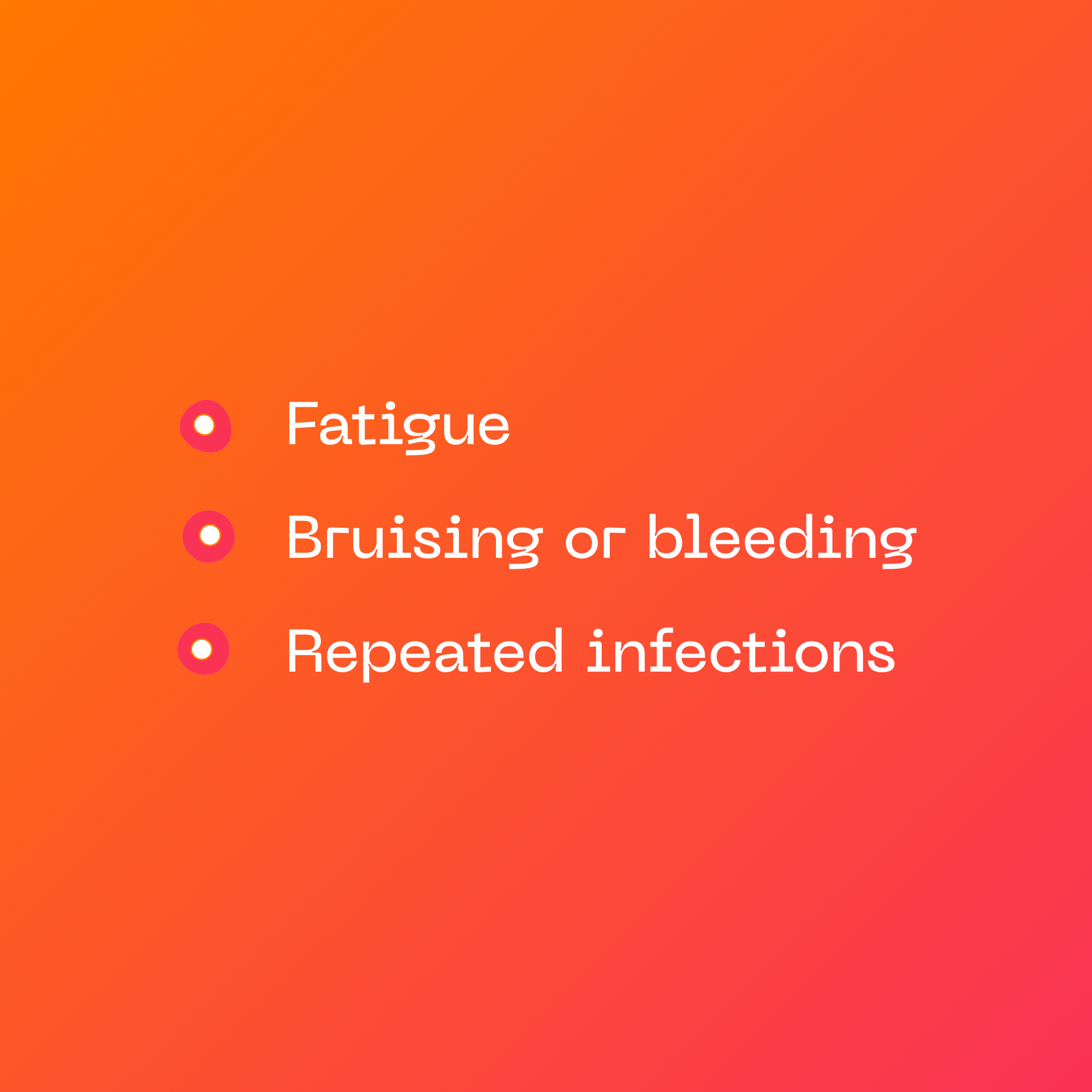
21 Apr 2023
Seven things you might not know about AML
Facts and figures updated in April 2024
Every year about 3,100 people in the UK are diagnosed with acute myeloid leukaemia, or AML, but how much do you know about the disease? And what is Leukaemia UK doing about it? 21st April is AML World Awareness Day and we’re joining the global blood cancer community to raise awareness of AML and shine a light on some of the research we’re funding. Research that we hope will accelerate progress in leukaemia treatment and diagnosis and improve the lives of those affected by the disease today and in the future.
1. AML is a cancer of the white blood cells
AML is an type of leukaemia that progresses rapidly, which is why it is called ‘acute’. This also means it usually requires immediate treatment. The word ‘myeloid’ refers to the type of white blood cells affected – the myeloid cells.
AML develops when the bone marrow produces abnormal white blood cells. These cells multiply uncontrollably, preventing the body from producing enough of the healthy blood cells it needs.
Other types of leukaemia include acute lymphoblastic leukaemia (ALL), chronic lymphocytic leukaemia (CLL) and chronic myeloid leukaemia (CML). AML is the second most common type of leukaemia.
2. The signs and symptoms can be ambiguous
 Like leukaemia more generally, the signs and symptoms of AML can be similar to those of common conditions, so it can be hard to spot. The common symptoms to look out for can include:
Like leukaemia more generally, the signs and symptoms of AML can be similar to those of common conditions, so it can be hard to spot. The common symptoms to look out for can include:
- Fatigue
- Bruising, bleeding or rashes
- Repeated infections
- Feeling weak or breathless
- Fever or night sweats
- Bone or joint pain
It’s important to know what’s normal for you. If you or a loved one experience one or a combination of these symptoms, it’s always best to ask your GP for a blood test.
3. Survival rates from AML are one of the lowest of any cancer type
Whilst improvements have been made, only 13.6% of people diagnosed with AML in the UK survive beyond five years. But research brings hope of a future where revolutionary new treatments could help stop AML devastating lives.
Every day, Leukaemia UK is accelerating progress through life-changing research that could hold the key to kinder, more effective treatments for people diagnosed with AML and other types of blood cancer.
4. AML is most common in the over 60s
AML doesn’t discriminate. It affects people of all ages – from babies to grandparents – but it is most common in the over 60s.
5. AML is more common in men
Around 1,300 females are diagnosed with AML each year in the UK, compared with around 1,700 males.
6. AML is the second most common type of leukaemia to affect children
Although children can be diagnosed with AML, treatment often works well – 5 year survival for children with the disease is now around 65-70%. Whilst it’s unacceptable that any child develops AML, the numbers are low in comparison to adults – with 77 under 15s diagnosed in the UK versus over 2,300 adults over 60.
Children with Down’s syndrome are 150 times more likely to develop acute myeloid leukaemia (AML).
7. We’re funding research to help stop AML devastating lives
Important discoveries are happening all the time within leukaemia research and we believe research has the power to stop AML devastating lives.
For his Leukaemia UK Project Grant, Professor Terry Rabbitts, Institute of Cancer Research, and his team will explore a new approach to targeting fusion proteins within cancer cells. This innovative approach holds the potential to minimise the debilitating side effects of current treatments.
Leukaemia UK is determined to create change and help more people survive AML through our research. Read Bex’s acute myeloid leukaemia story.
This April, you can support vital research into AML and other blood cancers. Thank you.
Find out more about AML World Awareness Day on the official AML World Awareness Day website.
Related posts
25 June 2019
Championing groundbreaking therapies and emotional support
We are proud to be at the forefront of funding innovative research into gene therapy treatments
1 August 2022
A research breakthrough targets cancer over healthy tissue, bringing possibility of a new treatment option for most deadly type of leukaemia
A new scientific paper published on 22nd June in Science Translational Medicine, announced a breakthrough by Leukaemia UK-funded scientist Dr William Grey that could lead to a vital new treatment option for…
24 September 2021
Leading leukaemia charities call on Rishi Sunak not to cut financial lifeline for blood cancer patients
Leukaemia Care, Leukaemia UK and Leukaemia and Lymphoma Northern Ireland, have written to the Chancellor urging him to realise the devastating impact the end of the Coronavirus Job Retention Scheme will have on the clinically extremely vulnerable (CEV).
16 November 2021
Charities call on NHS to treat blood cancer equally in decision-making
The Blood Cancer Alliance undertook an evidence review to inform a new report exploring the unmet needs of people with blood cancer across the UK.